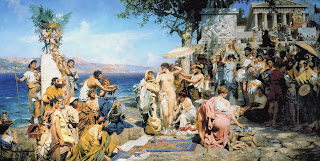EARTHQUAKES
I promised myself that I shall not write about current
events on this blog, but as I am a survivor of the devastating earthquake,
measuring 7.2 of the Richter scale that left Cephalonia and Zakynthos to smithereens
with 800 dead and many injured in both islands, I decided to change my mind.
A strong earthquake measuring 5.8 of the Richter scale hit
Crete 28 kilometres southeast of Heraklion leaving one man dead, several injured
and heavy damages. My sincere
condolences to the family of the unfortunate man ands my hopes for a speedy
recovery of the injured.
There are many major operas that are based on themes and
personalities from Greek mythology. That
means that all one needs to know about the universality of Greek mythology and
history how much they have meant to the Western world and how much they mean to
us all over the millennia.
The titanic themes of love, power, jealousy, greed, and fear,
they are all there in Greek mythology and history, and of course, they are
represented in opera as well.
As the world still reels from the cultural effects of the
pandemic, which caused almost all cultural and entertainment venues to close,
the opera troupes are just now beginning to stage operas once again. Let’s take a look at the greatest of all
operas based on themes of Greek mythology.
Opera as we know it today began in 1597 with Ottavio Renuccini’s “Dafne” (Daphne) set to music by Jacopo Peri.
The group of Florentine poets and musicians to which
Renuccini belonged, known as “La Camerata”, sought to revive Greek drama as
part of Renaissance of Greek classical culture that was taking part in Western
Europe at the time.
Universally acknowledged as opera’s first masterpiece
Claudio Monteverdi’s “L’Orphe” (Orpheus) was a gelling of ideas of great minds
of the Camerata and other composers of the time.
“Les Troyens” (The Trojans)
is an opera based on the history of the Trojan War by Hector Berlioz and was written and
composed 1851-1958 and is another opera based on Greek history.
“Alessandro” by George Friedrich Handel was composed in 1726
and recounted the incredible story of Alexander the Great.
“Medee” (Media) by Cherubin,
with a libretto by Francois Benoit Hoffmann.
This is a French-language opera-comique on Euripedes’ tragedy of Media
which is set in ancient Corinth.
Greece’s opera queen Maria Callas performed this work to thunderstorm
ovation in 1961 at “La Scala” at Milan.
“Phryne” is a opera-comique by Camille Saint-Saens, based on
the Greek courtesan Phryne.
“Themistocle” (Themistocles)
by Johan Christian Bach. The opera takes place in Persia. Themistocles with his son Neocles have been
expelled from Athens. He arrives
incognito at Susa, the capital of his arch enemy King Seise to find out that
his daughter Aspasia with the Athenian ambassador Lisimacho has also made her
way there. Eventually all is revealed and Seise magnanimously pardons
everybody, unites the lovers and makes peace with Athens.
“Thespis” or ”The Grown Old” is an operatic extravaganza by
Gilbert and Sullivan. Thespis premiered at
in London at the Gaiety Theatre in December 1871 and was a great success.
“Idomeneus”, referring to the king of Crete Idomenus is an Italian opera by Wolfgan Amadeus Mozart is considered to be one of greatest operas of the time. Idomeneus premiered in January 1781 at the
Cuvillies theatre in Munich.
“Orpheus in the Underworld” by Jacques Offenbach with a
French-language libretto by Hector Cremieux is a light-hearted, satirical
treatment of the ancient myth of Orpheus. It premiered in October 1858 at the
theatre of Bouffes Parisiens in Paris.
“Sappho” by Charles Gounod
Sapho is a female poet from the island of Lesbos famous for her lyric
poetry. Most of her poetry is now tragically lost, only the “Ode to Aphrodite”
is complete.
“Ariadne of Naxos” by Richard Strauss. This1912 opera has a German libretto by Hugo von Hofmannsthal. Ariadne of Naxos has two parts, prologue, and opera. At the home of a rich man in Vienna preparations for an evening of music are underway. Two groups of musicians and singers have already arrived. One is a burlesque group led by saucy comedienne Zerbinetta, the other is an opera company that will present the opera “Ariadne of Naxos, the work of the composer. The second part of the opera shows Ariadne abandoned by her lover and the burlesque group tries to cheer her up and insist that the only way to retaliate is to get a new lover. But she stays at Naxos with no company except the nymphs Naiad, Dryad, and Echo. But finally, she finds Harlequin a baritone and they sing love songs together.
Greek mythology has formed the theme for so many works
created over the centuries by the most brilliant artists of modern times
bringing ancient Greece to life one more.
PLEASE DO BE VACCINATED AGAINST COVID - 19 SO THAT YOUR BELOVED FAMILIES, FRIENDS, THE WORLD AND YOU WILL REMAIN HEALTHY AND SAFE
.













No comments:
Post a Comment